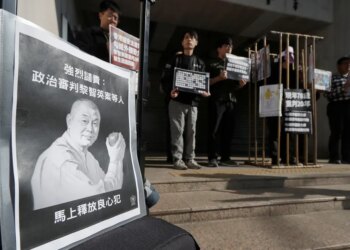
Texas A&M University System regents voted Thursday to limit how instructors may discuss matters like gender identity and race ideology in classrooms, tightening the rules in a conservative state where debates over academic freedom have flared for months.
Regents, who met in College Station on Thursday afternoon, unanimously backed a revised proposal decreeing that no courses “will advocate race or gender ideology, or topics related to sexual orientation or gender identity” without a campus president’s approval of the course and related materials.
A related measure that regents approved said that faculty members could not “teach material that is inconsistent with the approved syllabus for the course.”
Taken together, the policies represent an effort by Texas A&M system leaders to assert firmer control over classrooms at a time when Republican officials in the state have been accusing public universities of “indoctrinating” students with liberal ideas about race and gender — a movement that has unfolded in parallel to President Trump’s campaign to pressure elite schools. Professors have fired back that conservative politicians are seeking to stifle open debates and intellectual inquiry.
Texas, the nation’s most populous conservative state, has been a hot spot, with both its K-12 and higher education systems ensnared in battles over what should surface in the state’s classrooms. Similar fights have occurred in other states, including Florida and Indiana.
In September, Texas A&M fired a lecturer after a student accused her of teaching a course that recognized more than two genders.
Sam Torn, a regent who chairs the Committee on Academic and Student Affairs, did not explicitly cite that furor on Thursday. But he said that it had “become clear” in recent months that some Texas A&M courses were veering beyond what administrators wanted.
“Curriculum is created and approved based on the accepted body of knowledge needed for our students to be successful in their chosen profession,” Mr. Torn said. “It is unacceptable for other material to be taught instead.”
James R. Hallmark, the university system’s vice chancellor for academic affairs, insisted that the language adopted on Thursday amounted to a “refinement and clarification” of existing policies and did not “introduce new limitations on scholarly inquiry.”
“The goal is simple and straightforward: to ensure that what is taught in the classroom accurately reflects the approved curriculum and that students receive a learning environment grounded in clarity, academic rigor and respect,” Dr. Hallmark told regents hours before Thursday’s final vote.
Empowering campus administrators to set limits on the curriculum, Dr. Hallmark said, did not reflect an effort at “policing individual speech.” Toughening the policy against instructors straying from approved plans, he said, “reinforces a core professional responsibility: teaching the course that students have registered for and the institution has approved.”
“This does not diminish academic freedom,” Dr. Hallmark added. “It reinforces the balance between academic freedom and academic responsibility.”
An initial proposal for one of the policies adopted on Thursday had floated a harder line. The draft — revised before regents met on Thursday — had said that no academic course would “teach” about subjects like gender ideology. The regents ultimately adopted a rule typically prohibiting courses from advocacy on certain topics, a distinction that could help university system leaders rebut criticism that they were dictating teaching.
Faculty members have been warning, however, that administrators were trying to assume too much power.
“By considering these policy changes, the Texas A&M University System Board of Regents is telling faculty, ‘Shut up and teach — and we’ll tell you what to teach,’” Brian Evans, the president of the Texas Conference of the American Association of University Professors, said in a statement before Thursday’s meeting.
The “censorship” proposed by regents, he said, would “cause irreparable harm to the reputation of the university, and impede faculty and students from their main mission on campus: to teach, learn, think critically, and create and share new knowledge.”
And Leonard Bright, the president of the A.A.U.P. chapter at Texas A&M, said that instructors at the university were effectively being envisioned “as foot soldiers in a crusade to decimate what has made Texas higher education a powerhouse of research: the commitment to academic rigor, carried out every day by highly trained and credentialed faculty.”
Clashes over the role of race and gender in American institutions have intensified in the Trump era, but vague definitions have often clouded the debate. The Texas A&M policy describes gender ideology as “a concept of self-assessed gender identity replacing, and disconnected from, the biological category of sex.” The policy defines race ideology as, among other things, “a concept that attempts to shame a particular race or ethnicity.”
It is not entirely unusual for universities to take steps to limit politics in the classroom. The University of California, for example, has a policy that says allowing a classroom “to be used for political indoctrination” or “for purposes other than those for which the course was constituted” can be “misuse of the university as an institution.”
But the Texas A&M policies are drawing particular scrutiny because they impose limits around specific subjects that have often riled conservative leaders in the state.
Indeed, college professors across the country have expressed fears for months about how the Trump administration and state Republican officials might try to curb their academic freedom.
A federal judge in San Francisco is expected to rule within days on a request from labor groups that the Trump administration be forbidden “from using the threat of legal and financial sanctions in retaliation for the exercise of free speech rights” by people associated with the University of California.
Many California officials have unabashedly supported the university system, which the Trump administration targeted over the summer with a settlement proposal that included more than $1 billion in penalties.
But the dynamics have been far different in Texas. State officials like Gov. Greg Abbott have placed pointed pressure on universities to fall in line with their vision, which looks much like Mr. Trump’s.
Last year, Texas A&M dropped a minor in L.G.T.B.Q. studies following pressure from a state representative who earned a degree from the university. Then, days before Mr. Trump took office in January, Mr. Abbott publicly threatened the job of the Texas A&M president at the time over a diversity, equity and inclusion conference. The Texas A&M president survived that firestorm, but he stepped down after the September firing of the lecturer, Melissa McCoul, and the demotions of other administrators.
The instructor — whose teaching Mr. Abbott asserted was “contrary to Texas law” — has appealed her dismissal. Amanda L. Reichek, a lawyer for Dr. McCoul, said Thursday that she was awaiting a decision on the appeal after a hearing earlier this month.
Although the Texas A&M system is most commonly associated with the campus in College Station, where Dr. McCoul taught, it includes a dozen universities and a health sciences center that altogether enroll about 165,000 students. The policies approved on Thursday apply throughout the system.
Alan Blinder is a national correspondent for The Times, covering education.
The post Texas A&M Tightens Rules on Talking About Race and Gender in Classes appeared first on New York Times.



